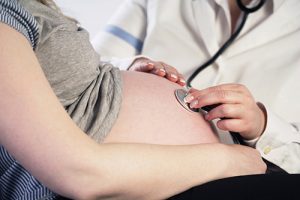
“Importantly, we found neither SARS-CoV-2 diagnostic positivity nor immediate evidence of symptomatic COVID-19 among these infants born to symptomatic, test-positive mothers,” commented Yalan Liu, PhD, at Huazhong University of Science and Technology, and colleagues in their Frontiers in Pediatrics report, which is titled, “Infants born to Mothers with a New Coronavirus (COVID-19).” Liu also works in the Department of Pediatrics at Union Hospital.
The study by Liu and colleagues follows on from a report by researchers in China, and published in The Lancet in February on the results of a study in nine pregnant women with laboratory-confirmed COVID-19 pneumonia. This report had also concluded that there was “… currently no evidence for intrauterine infection caused by vertical transmission in women who develop COVID-19 pneumonia in late pregnancy.”

Liu et al. followed four pregnant women who presented with symptomatic COVID-19 infections during the 3rd trimester of pregnancy. Four full-term infants were born. Cesarean sections were performed for 3 patients in the acute phase of the disease, and the fourth patient underwent a vaginal delivery because of the onset of labor. The nine mothers followed in the prior study in The Lancet had all undergone Caesarian sections.
“To avoid infections caused by perinatal and postnatal transmission, our obstetricians think that C-section may be safer,” Liu said. “Only one pregnant mother adopted vaginal delivery because of the onset of the labor process. The baby was normal. Maybe vaginal delivery is OK. It needs further study.”
None of the four infants in the latest study developed any serious symptoms, such as fever or cough, which are associated with COVID-19, although all four were initially isolated in neonatal intensive care units and fed formula. Three of the four tested negative for the respiratory infection following a throat swab, while the fourth child’s mother declined permission for the test. “ … we found neither SARS-CoV-2 diagnostic positivity nor immediate evidence of symptomatic COVID-19 among these infants born to symptomatic, test-positive mothers,” the investigators noted.
One newborn did experience a minor breathing issue for three days, and this was treated using non-invasive mechanical ventilation. Two babies, including the one with the respiratory problem, exhibited body rashes that eventually disappeared on their own. The team acknowledged it’s not possible to conclude whether there’s a connection between these other medical issues and COVID-19. “We are not sure the rash was due to the mother’s COVID-19 infection,” said Liu. All four infants remained healthy, and their mothers also fully recovered.
In previous coronavirus outbreaks, scientists found no evidence of viral transmission from mother to child, but SARS and MERS were both associated with “critical maternal illness, spontaneous abortion, or even maternal death,” according to Liu.
The authors said further investigations into other aspects of potential COVID-19 infection in newborns and children are needed. For example, the sensitivity of the current diagnostic test for detecting the virus is about 71%, they noted, and its reliability should be evaluated in children. “Further study for viral infection in placenta, amniotic fluid, neonatal blood, gastric fluid and anal swab, and the viral depending receptor on children will be detected in future,” they further commented.


